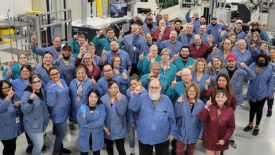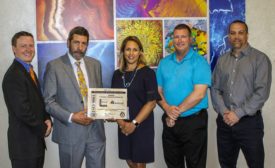Home » Keywords: » ISO certification
Items Tagged with 'ISO certification'
ARTICLES
Column | John Vandenbemden
The question is how vulnerable are you to a cyberattack?
Read More
Column
EPA’s Oil Spill Prevention, Control, Countermeasure Program
The Spill Prevention, Control and Countermeasure is a requirement for all manufacturers from steel to food that handle any fluids operating equipment.
December 23, 2024
Column
ISO 10012 Update
This standard can be used by any industrial sectors requiring a measurement management system, and is complementary to the requirements of ISO 9001, ISO 14001 or any other management system standard.
November 11, 2024
Standards 101 | Roderick A. Munro
Upgrading Your ISO Internal Audit Process
The internal team should be so robust that they make it very hard for the external auditor to find much.
November 4, 2024
Management
ISO Certification Needs to Change
Despite stringent quality controls and advanced technologies, the aircraft industry has faced significant quality problems over the years.
October 24, 2024
Column | John Vandenbemden
ISO45001 and the OSHA Regulations
Since its publication there have been numerous articles about ISO 45001 but very little about OSHA and its requirement in Occupational Safety and Health Standards 29 CFR 1910.
September 29, 2024
Management
The Rise of AI Governance: Unpacking ISO/IEC 42001
The need for AI governance has never been more pressing.
July 5, 2024
Management | 2024 Quality Leadership Ranking
Five Quality Companies to Know: Tecnova Electronics
The annual Quality Leadership ranking is back.
January 8, 2024
ISO 9001:2015 Implementation: The Good, the Bad and the Trending
The future for ISO 9001 is strong.
November 8, 2018
INDUSTRY HEADLINE
Buehler Celebrates 20 Consecutive Years Of ISO Certification With DQS Inc.
June 18, 2018
Stay in the know with Quality’s comprehensive coverage of
the manufacturing and metrology industries.
eNewsletter | Website | eMagazine
JOIN TODAY!Copyright ©2025. All Rights Reserved BNP Media.
Design, CMS, Hosting & Web Development :: ePublishing












